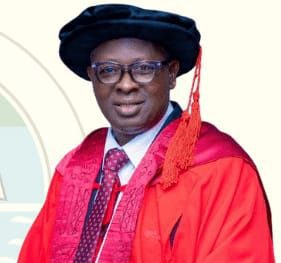A Professor of Haematology and Blood Transfusion at the College of Medicine, University of Lagos, Sulaimon Akanmu, has suggested that the Federal Ministry of Health and the National Agency for the Control of AIDS use fourth-generation screening kits for testing HIV antibodies in order for the country to effectively manage the epidemic.
Akanmu, who is a Consultant Haematologist at the Lagos University Teaching Hospital, made this recommendation on Wednesday during the 14th Inaugural lecture for the 2023/2024 academic session of the institution.
In his lecture titled, “The virus and the malnourished red cells: It is only a matter of time; Humanity is set to have the last laugh over the virus,” the don discussed the impact of HIV/AIDS and the associated mortality and morbidity from the disease in its early days.
The haematologist also described the role of anaemia in the mortality and morbidity linked with HIV infection in its early stages, stating that what most authorities, including the World Health Organisation, did not recognize early on was that mortality resulting from AIDS-defining illness could largely be predicted by the presence of anaemia.
He pointed out that in the early stages of HIV infection, a key indicator of death in severely immuno-HIV-infected adult patients was anaemia.
He explained that the reason for the prevalence of anaemia in HIV-infected individuals was that HIV caused malnourishment of the red cells.
According to him, anaemia was so widespread in HIV-infected patients that the definition of anaemia in the context of HIV infection needed to be modified compared to the standard definition.
The professor added that science has always been one step ahead of the virus, revealing that the development of Antiretroviral Therapy offered a source of hope.
Akanmu assured everyone that the days of HIV infection as a dreaded disease are limited, confirming that with effective use of ARTs by people living with HIV, Nigeria and the rest of the world would be able to reach a point where no new infections would occur—achieving epidemic control.
The former president of the Nigerian Society for Haematology and Blood Transfusion stated, “What the virus has done to humanity, God almighty has given humanity the knowledge to be able to tackle the virus.
” I spoke about what we call achieving epidemic control by which we mean that with effective use of retroviral therapy, we would be able to get to a point where no new infection will occur.
“ Because everybody that is HIV infected and is on effective ARTs will be incapable of infecting another person and when that happens, it will be the beginning of what we refer to as epidemic control.”
The Sustainable Development Goal 3.3 aims to end the AIDS epidemic by 2030, which involves a reduction in incidence worldwide.
HIV epidemic control is defined by the World Health Organisation as the reduction of disease incidence, prevalence, morbidity, and/or mortality to a locally acceptable level as a result of deliberate efforts.
Explaining the importance of achieving HIV epidemic control, Akanmu mentioned that using ARTs effectively can add at least 33 years to the lifespan of people living with HIV on therapy.
When the viral load becomes undetectable, a person on effective HIV treatment is estimated to be able to infect less than one person in 33 years.
These are measurements, and many countries are already achieving them, with Nigeria expected to join soon.
The goal is to achieve an Incidence Prevalence Ratio of 1/33, signifying the day epidemic control has been achieved when no new infections occur.
It's essential to confirm that no new infections are happening in order to claim epidemic control, and this requires determining whether positive tests indicate new infections.
The technology recommended to the Federal Ministry of Health and NACA can distinguish between new and existing HIV infections.
The country can achieve this by adopting fourth-generation screening kits for testing HIV antibodies.
NACA estimates that 1.8 million individuals are living with HIV in Nigeria, with about 1.63 million already receiving ARV medication.
Akanmu, with a background in haematology and blood transfusion, began his journey in HIV medicine in 1987, when there were very few antiretroviral drugs available.
It all started in 1987 when the WHO declared HIV as transmissible through blood and mandated the use of Enzyme-Linked Immunosorbent Assay (ELISA) for blood screening.
Prof. Folasade Ogunsola, Vice-Chancellor of UNILAG, praised Akanmu for his insightful lecture and recognized him as a distinguished scholar who has contributed significantly to his field and humanity.



